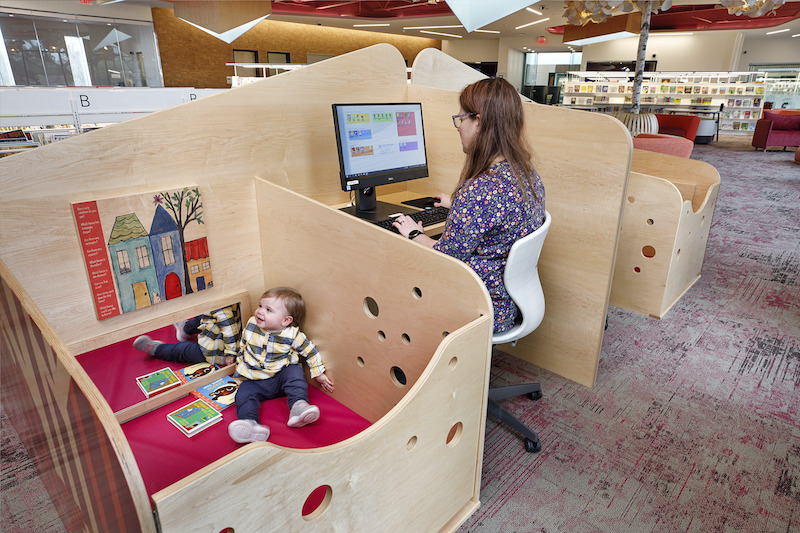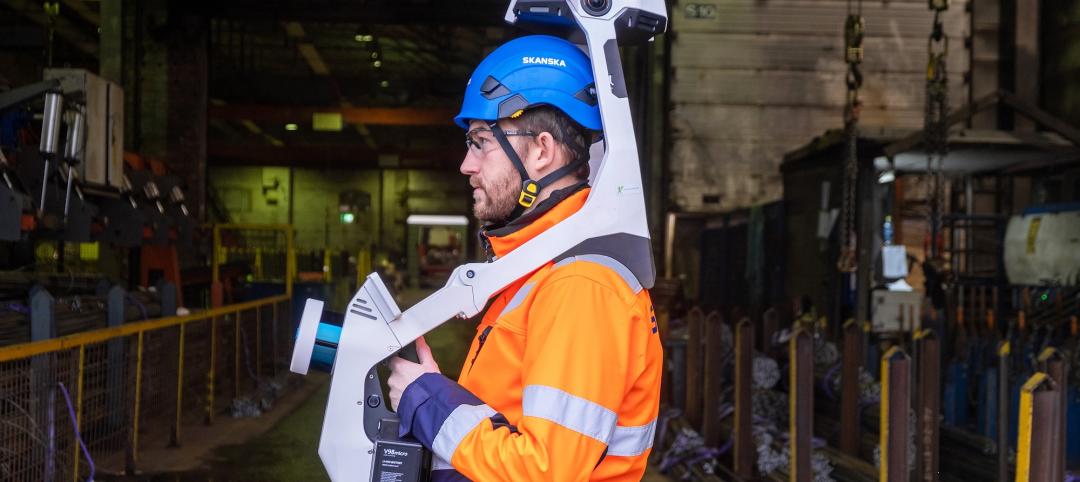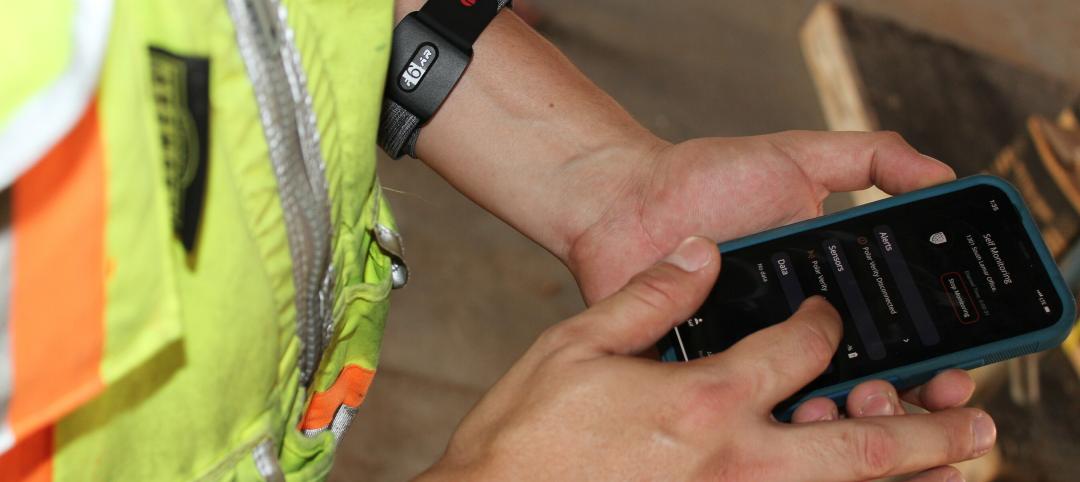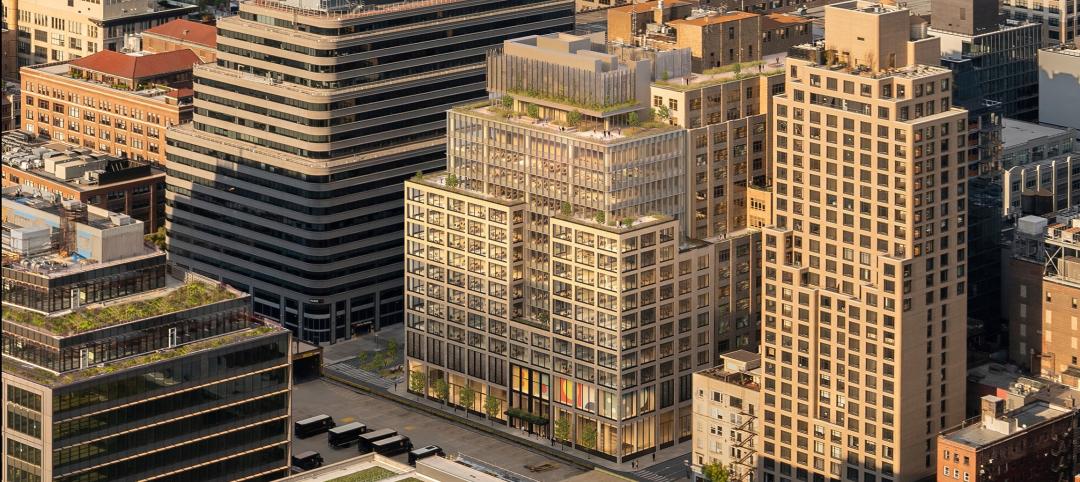As libraries position themselves less as a place just for books and more as community centers, designers are beginning to get creative in how to make spaces as inclusive and family friendly as possible.
The 44,803-sf, Quinn Evans-designed Fairfield Area Library in Henrico County, Va., has a simple new feature that the firm says is the first of its kind in the country and hopes it will go a long way in creating a family-friendly library space.
Quinn Evans collaborated with TMC Furniture to create four custom workstations meant for library patrons and their children. The workstations feature an adult-sized desk for the parent or caregiver attached to a play space outfitted with activities to support early learning.
See Also: Mobile wayfinding platform helps patients, visitors navigate convoluted health campuses
The four workstations, dubbed The Fairfield, are located in the children’s area on the second floor so parents and caregivers can also watch any older children they may have reading and playing nearby. As parents or caregivers sit at the desk and use the computer, small children can be placed in the attached play space (think a motorcycle with a sidecar), which is easily observable from the desk area. The play spaces, which have been designed for infants and toddlers up to two years of age, feature a mirror at the lowest level and a series of interactive learning panels above. A durable vinyl mat, which can be easily wiped down, cushions the bottom of the play space.
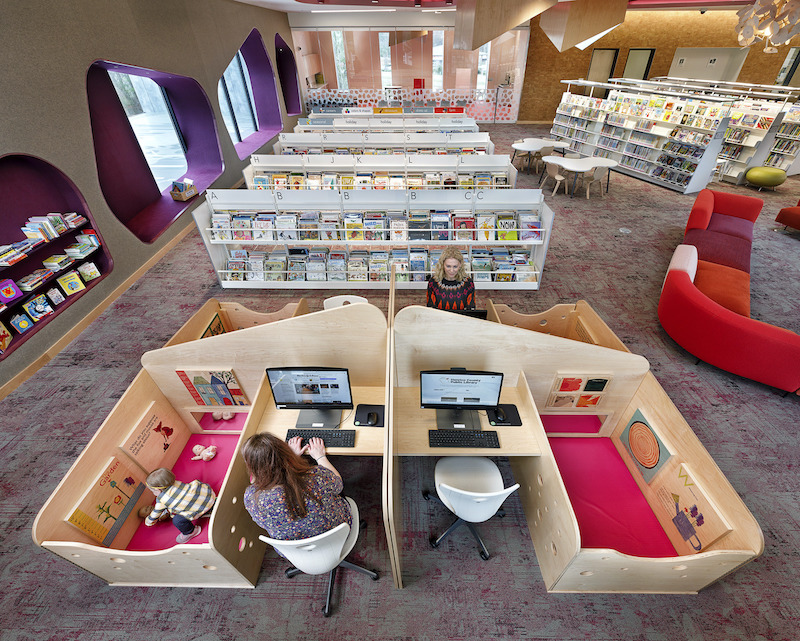 The four custom workstations feature attached play spaces designed for infants and toddlers, with a mirror at the lowest level and a series of interactive learning panels above. Photo: Chris Cunningham, courtesy of Quinn Evans.
The four custom workstations feature attached play spaces designed for infants and toddlers, with a mirror at the lowest level and a series of interactive learning panels above. Photo: Chris Cunningham, courtesy of Quinn Evans.
Library staff can switch out the panels as desired to provide a variety of content from day to day.
The play space’s exterior panels are designed with a woodland scene, and the materials and colors of The Fairfield complement the aesthetics of the library interior, integrating them into the overall design scheme. Perforated circles in varying shapes allow babies to peek out of the play space while also echoing the curvilinear, organic shapes prevalent throughout the children’s area. Wooden panels separate the workstations, giving each user privacy, but still allowing them to see the child in the attached play area.
The vinyl mat and the maple finish on the workstations are non-toxic and can stand up to frequent cleanings while a gate on the play area further simplifies access and cleaning efforts.
When the library opened in October 2019, The Fairfield immediately became a hit among patrons with children. “One woman, who came to the reception with an infant and young child, said ‘I’m going to be in the library all the time because you’ve got a place for me.’ We were excited to be able to create something that supports the library’s goals while also complementing the overall design vision for the space,” said Shannon Wray, CID, LEED AP, Senior Associate with Quinn Evans.
Related Stories
3D Printing | Sep 13, 2024
Swiss researchers develop robotic additive manufacturing method that uses earth-based materials—and not cement
Researchers at ETH Zurich, a university in Switzerland, have developed a new robotic additive manufacturing method to help make the construction industry more sustainable. Unlike concrete 3D printing, the process does not require cement.
Smart Buildings | Jul 25, 2024
A Swiss startup devises an intelligent photovoltaic façade that tracks and moves with the sun
Zurich Soft Robotics says Solskin can reduce building energy consumption by up to 80% while producing up to 40% more electricity than comparable façade systems.
Great Solutions | Jul 23, 2024
41 Great Solutions for architects, engineers, and contractors
AI ChatBots, ambient computing, floating MRIs, low-carbon cement, sunshine on demand, next-generation top-down construction. These and 35 other innovations make up our 2024 Great Solutions Report, which highlights fresh ideas and innovations from leading architecture, engineering, and construction firms.
Building Technology | Jun 18, 2024
Could ‘smart’ building facades heat and cool buildings?
A promising research project looks at the possibilities for thermoelectric systems to thermally condition buildings, writes Mahsa Farid Mohajer, Sustainable Building Analyst with Stantec.
75 Top Building Products | Apr 22, 2024
Enter today! BD+C's 75 Top Building Products for 2024
BD+C editors are now accepting submissions for the annual 75 Top Building Products awards. The winners will be featured in the November/December 2024 issue of Building Design+Construction.
AEC Tech | Feb 20, 2024
AI for construction: What kind of tool can artificial intelligence become for AEC teams?
Avoiding the hype and gathering good data are half the battle toward making artificial intelligence tools useful for performing design, operational, and jobsite tasks.
Sustainability | Nov 1, 2023
Researchers create building air leakage detection system using a camera in real time
Researchers at the U.S. Department of Energy’s Oak Ridge National Laboratory have developed a system that uses a camera to detect air leakage from buildings in real time.
Resiliency | Aug 7, 2023
Creative ways cities are seeking to beat urban heat gain
As temperatures in many areas hit record highs this summer, cities around the world are turning to creative solutions to cope with the heat. Here are several creative ways cities are seeking to beat urban heat gain.
AEC Innovators | Jun 15, 2023
Rogers-O'Brien Construction pilots wearables to reduce heat-related injuries on jobsites
Rogers-O'Brien Construction (RO) has launched a pilot program utilizing SafeGuard, a safety-as-a-service platform for real-time health and safety risk assessment. Non-invasive wearables connected to SafeGuard continuously monitor personnel to prevent heat exhaustion on jobsites, reducing the risk of related injuries. RO is the first general contractor to pilot this program.
Office Buildings | May 15, 2023
Sixteen-story office tower will use 40% less energy than an average NYC office building
This month marks the completion of a new 16-story office tower that is being promoted as New York City’s most sustainable office structure. That boast is backed by an innovative HVAC system that features geothermal wells, dedicated outdoor air system (DOAS) units, radiant heating and cooling, and a sophisticated control system to ensure that the elements work optimally together.


